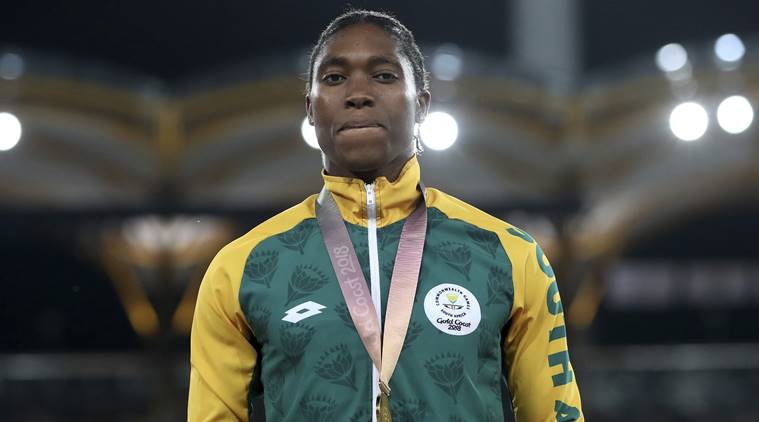 South Africa’s Caster Semenya has approached CAS over IAAF’s rule on high levels of testosterone. (Source: AP)
South Africa’s Caster Semenya has approached CAS over IAAF’s rule on high levels of testosterone. (Source: AP)
On Monday, track and field star Caster Semenya announced that she would knock on the doors of the Court of Arbitration for Sport (CAS) to challenge restrictions placed by the International Association of Athletics Federations (IAAF) on female athletes with naturally-occurring high levels of testosterone.
Semenya’s legal team will comprise the who’s who of sports and human rights lawyers from Canada and South Africa. She has Indian sprinter Dutee Chand to thank for helping her assemble a formidable legal team.
In April this year when the (IAAF) introduced rules limiting testosterone levels in females who want to participate in races between 400 metres and a mile, it was seen as a move to stop Semenya from winning more medals on the global stage.
The new rules, which will be implemented from November 1, provided relief for Indian sprinter Dutee as the 100 metres and 200 metres were not deemed as ‘restricted events’. In her moment of triumph, Dutee reached out to Semenya, who she says is a dear friend, and offered moral support. In an email to Semenya, Dutee also offered the services of her legal team based in Toronto.
Lawyers James Bunting and Carlos Sayao of the firm Davies had represented Dutee at CAS where the Indian athlete successfully challenged the hyperandrogenism guidelines, which placed a ban across events.
When Semenya knocks on the doors of the highest court in sport to take on the might of IAAF’s medical and legal team, she will have the legal heft of Davies, which has come on board to join South Africa-based lawyers from Norton Rose Fulbright.
“In April when I got to know that Semenya was being targeted by the IAAF through their new ruling, I wrote her an email and told her that I could ask my legal team to help her. She replied that it would be good. I shared Semenya’s details with Dr Payoshni Mitra and asked her to help her,” Dutee said on Monday.
Mitra was the government-appointed advisor when Dutee appealed to Lausanne-based CAS and she also testified during the hearing.
“I can confirm that Dutee and I have helped connect Caster and her South African legal team at Norton Rose Fulbright consisting of Gregory Nott, Patrick Bracher and Sandra Sithole to Dutee’s team comprising James Bunting and Carlos Sayao at Davies in Toronto. They are all part of Caster’s team now,” Mitra said.
The only way athletes like Semenya can participate in ‘restricted events’ at international meets, which will apply to the Olympics and the World Championships, is if there is a separate category for ‘intersex’ athletes in that particular event. The other option for Semenya is to undergo hormonal therapy to bring her testosterone levels to 5 nanomoles per litre or below – the threshold set by the IAAF.
“Ms Semenya, like all athletes, is entitled to compete the way she was born without being obliged to alter her body by any medical means,” Norton Rose Fulbright said in a statement on Monday.
Dutee had challenged the hyperandrogenism guidelines which had banned women athletes with elevated levels of testosterone from competing in track and field events. CAS had asked the IAAF to present fresh scientific evidence to justify the guidelines. The IAAF based the evidence in part on a study, published in the British Journal of Sports Medicine, in July last year. The study, which researched the link between track and field performance and higher-than-usual testosterone levels, involved 1,332 elite female athletes and 795 male athletes — a total of 2,127 subjects.
A blood sample was taken from each of these athletes, a number of whom had participated in the 2011 and 2013 World Championships. Women with higher levels of testosterone were seen to have a distinct advantage in 400m, 400m hurdles, 800m, 1,500 metres and also hammer throw and pole vault.
However, the IAAF did not place restrictions on hammer throw and pole vault when it replaced hyperandrogenism guidelines with a new set of rules which Semenya has now challenged.
“I don’t like talking about this new rule,” Semenya said on Monday. “I just want to run naturally, the way I was born. It is not fair that I am told I must change. It is not fair that people question who I am. I am Mokgadi Caster Semenya. I am a woman and I am fast.”
Similar sentiments were expressed by Dutee before she took on one of the most powerful sports bodies in the world at the highest court.